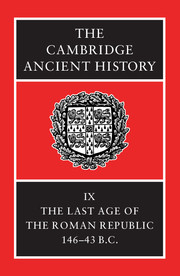18 - The Intellectual Developments of the Ciceronian Age
Published online by Cambridge University Press: 28 March 2008
Summary
In considering the level and nature of intellectual activity in Roman society, we are bound to be discussing, in the main, the culture of the Roman and Italian upper classes. Our evidence is such that it is easier to gauge their knowledge of Greek than the general level of literacy. We can note that second-century Roman legislators already assumed that their laws would be read throughout the peninsula and required that they be publicly displayed in a place where they could be easily seen; we can point to the graffiti at Pompeii which show that, in the first century A.D., in a prosperous town, a substantial proportion of the population could read and possibly write, though not to a very high standard. But such evidence tells us little about the numbers and kinds of people who could and would read sophisticated Latin prose and verse. There the most important factor must be the availability of education. One point, however, is worth making at the outset: that is, the importance of oral culture. Not only was drama, one of the earliest forms of Latin literature, accessible without reading, but so was oratory, which was not only the key to understanding public life but an intellectual and artistic product that reached its peak of sophistication and polish in this period. Political and forensic speeches in the Forum were a form of popular entertainment like dramatic performances, and Cicero attests the sensitivity of an ordinary audience to the arrangement of words and the use of metre or prose rhythm. Other forms of literature too were regularly recited: indeed the serious study of Latin literature had started in the middle of the second century when scholars started to prepare the works of Naevius and Ennius for recitation.
I. EDUCATION
Cicero, making a contrast with Greek education, notes with approval that Roman education was not publicly regulated or uniform. After their establishment, perhaps in the middle of the third century, feepaying primary schools must have become a regular feature of life in Rome, though, apart from allusions in Plautine comedy, we have little direct evidence. Many continued to learn their letters and the rudiments of arithmetic at home or, with other children, at the home of a neighbour who had a suitably trained slave, such as Cato’s Chilo. Secondary education on the Greek model developed rapidly in the latter part of the second century.
- Type
- Chapter
- Information
- The Cambridge Ancient History , pp. 689 - 728Publisher: Cambridge University PressPrint publication year: 1994

